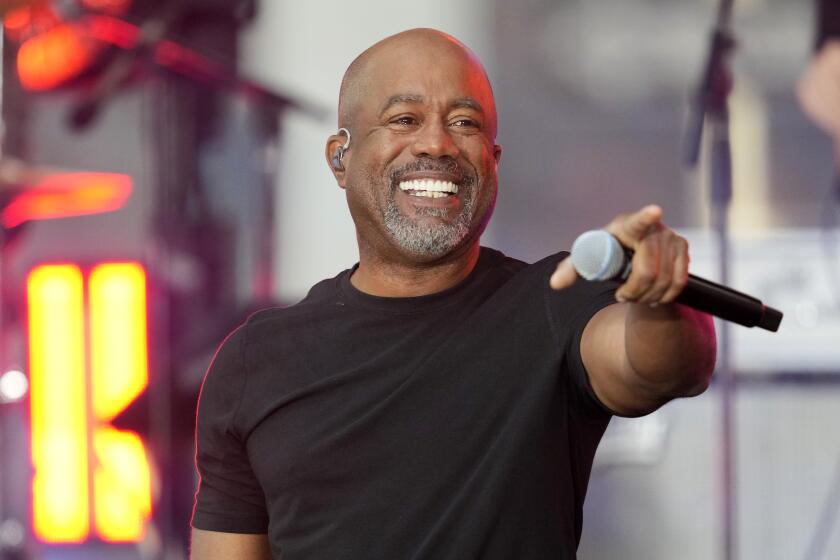RATT ‘N’ ROLL’S ROCK ROLLER-COASTER RIDE
Heavy metal is a hellish business. Musicians who prize stability and longevity avoid the genre. Some heavy-metal artists, like Ozzy Osbourne and Scorpions, do last for years, but most flame out quickly.
Many of last year’s hot heavy-metal bands, like Quiet Riot and Motley Crue, have already cooled off. It may be Ratt’s turn next. The new album by this local band is in trouble already. “Dancing Undercover” shot up the Billboard magazine pop chart like it would make the Top 10 easily. But then it stalled at No. 26. This week it drops to No. 30.
Crisis time. Will the album rally and surge into the Top 20, or will it sink, adding Ratt to the list of faltering heavy-metal bands?
Lead singer Stephen Pearcy, of course, is doggedly optimistic. Chart watching, he said, isn’t that important anyway:
“I don’t worry about the charts. We don’t live and die by what they say. Who reads Billboard anyway? Our fans don’t read Billboard. They’ll come to see us in concert. They don’t care if we’re No. 90 or No. 1 on the chart.”
Ratt’s problem, it seems, stems from an unlikely source--success. Its first two albums were blockbusters. The 1984 debut, “Out of the Cellar,” sold over 2 million. The follow-up, “Invasion of Your Privacy,” cracked the million mark. In the strange world of heavy metal, this could be Ratt’s quota of hit albums. Making it to the top of this loony genre is like the kiss of death. Decline often follows an album or two later.
Why?
For one thing, heavy metal fans are notoriously fickle. They tend to stick with their favorites for an album or two before switching to a trendy newcomer. Radio station programmers are a problem for metal bands too. They play lots of metal for a year or two and then drop it from their playlists. The radio programmers’ justification for the freeze is that it reflects fan tastes. Apparently, fans and radio programmers can only stomach a heavy diet of heavy metal for about two years before needing a breather of a year or so.
“The up-and-down part is hard to deal with,” Pearcy noted. “Radio controls things. Bands that play our kind of music have to learn to do without radio if they want to survive.”
Ratt, Pearcy insisted, focuses on performing rather than albums and radio: “We think live. When we’re recording we don’t think how it’s going to sound on radio. We only think how it’s going to work live.”
Pearcy, of course, reveres Ratt’s music, which its followers have labelled ratt ‘n’ roll. But Ratt’s music--raunchy, melodic metal--has never been exceptional. It’s always been higher in energy than quality. In concert, metal fans like to be blasted out of their seats. Ratt’s music has always served that purpose well.
Pearcy, like most metal artists, insisted his band isn’t heavy metal. “It’s hard rock,” he said, preferring to avoid metal’s sinister stigma. “If we were metal, I’d proudly say so.”
Despite Pearcy’s protestations, Ratt has always been and probably always will be considered heavy metal.
Pearcy, 27, is a typical strutting, shrieking metal singer whose vocals are mostly obliterated by the loud, crunching music of his colleagues: Robbin Crosby (guitar), Warren DeMartini (lead guitar), Juan Croucier (bass) and Bobby Blotzer (drums). Pearcy migrated to Los Angeles from San Diego in 1980 and formed Ratt a year later.
On stage, Pearcy comes across as an arrogant, untamed rogue. Offstage, you’d think he’d be obnoxious, barely bearable. Actually, he’s low-key, soft-spoken and quite likable. During the interview, instead of downing a couple of shots of hard liquor like most heavy- metal heroes would, he drank iced tea.
This is a heavy-metal hero? “I have my moments,” he said. “I can be as obnoxious as the next guy. I can be flashy too.” The only flashy thing about him that afternoon was his car. He showed up for the West Hollywood lunch in his new black Porsche.
Pearcy hinted that he turns wild man when Ratt is on the road. “I have my fun out there just like everybody else,” he said. “We just don’t brag about it. We don’t kiss and tell.”
This band doesn’t really have a surly, macho image. When fans think of Ratt, they don’t think of tough guys, they think of handsome guys. All its members are good-looking. That’s reportedly why its videos, which helped popularize the band two years ago, were so well-received on MTV. That’s also why its audience is largely female.
“It’s about 60% women,” Pearcy admitted.
He’s a bit leery of the large female following. “They don’t stick with you,” he lamented. “They grow up and forget about you. They drop you as quickly as they change an outfit. It doesn’t make you feel stable to have to count on these young girls. But we have no choice.”
More to Read
The biggest entertainment stories
Get our big stories about Hollywood, film, television, music, arts, culture and more right in your inbox as soon as they publish.
You may occasionally receive promotional content from the Los Angeles Times.










